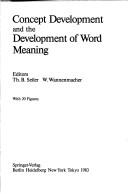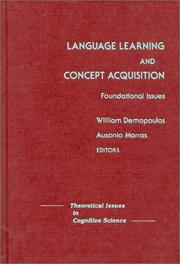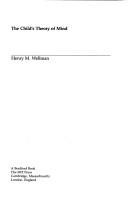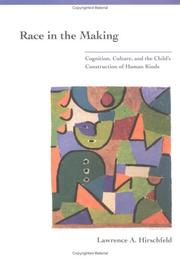| Listing 1 - 10 of 10 |
Sort by
|

ISBN: 3540122516 3642690025 3642690009 9783540122517 Year: 1983 Volume: 12 Publisher: Berlin: Springer,
Abstract | Keywords | Export | Availability | Bookmark
 Loading...
Loading...Choose an application
- Reference Manager
- EndNote
- RefWorks (Direct export to RefWorks)
Cognitive psychology --- Lexicology. Semantics --- Psycholinguistics --- Concept Formation. --- Semantics. --- Semantic --- Concept Formations --- Formation, Concept --- Formations, Concept --- Semantics --- Congresses --- Congresses. --- Language acquisition --- Meaning (Psychology) --- Concepts --- Concept Learning --- Conceptualization --- Learning, Concept --- Concept Formation --- Concept Acquisition --- Acquisition, Concept --- Acquisitions, Concept --- Concept Acquisitions

ISBN: 0893913162 Year: 1986 Publisher: Norwood, N.J. Ablex
Abstract | Keywords | Export | Availability | Bookmark
 Loading...
Loading...Choose an application
- Reference Manager
- EndNote
- RefWorks (Direct export to RefWorks)
Psycholinguistics --- Language acquisition. --- Concepts. --- Langage --- Concepts --- Acquisition --- Concept Formation. --- Language Development. --- Language acquisition --- Acquisition of language --- Developmental linguistics --- Developmental psycholinguistics --- Language and languages --- Language development in children --- Psycholinguistics, Developmental --- Interpersonal communication in children --- Concept formation --- Abstraction --- Knowledge, Theory of --- Perception --- Psychology --- Development, Language --- Developments, Language --- Language Developments --- Concept Formations --- Formation, Concept --- Formations, Concept --- Concept Formation --- Language Development --- Language Acquisition --- Acquisition, Language --- Concept Learning --- Conceptualization --- Learning, Concept --- Concept Acquisition --- Acquisition, Concept --- Acquisitions, Concept --- Concept Acquisitions
Book
ISBN: 0898592151 Year: 1983 Publisher: Hillsdale Erlbaum
Abstract | Keywords | Export | Availability | Bookmark
 Loading...
Loading...Choose an application
- Reference Manager
- EndNote
- RefWorks (Direct export to RefWorks)
Cognition. --- Imagery (Psychology). --- Memory. --- Cognition --- Imagery (Psychology) --- Memory --- Concept Formation --- 159.95*1 --- Retention (Psychology) --- Intellect --- Psychology --- Thought and thinking --- Comprehension --- Executive functions (Neuropsychology) --- Mnemonics --- Perseveration (Psychology) --- Reproduction (Psychology) --- Imagery, Mental --- Images, Mental --- Mental imagery --- Mental images --- Imagination --- Visualization --- 159.95*1 Cognitieve psychologie --- Cognitieve psychologie --- Concept Formations --- Formation, Concept --- Formations, Concept --- Executive Function --- Paivio, Allan. --- Concept Learning --- Conceptualization --- Learning, Concept --- Concept Acquisition --- Acquisition, Concept --- Acquisitions, Concept --- Concept Acquisitions

ISBN: 0262231530 0262285940 0585023514 9780262231534 Year: 1990 Publisher: Cambridge (Mass.) : MIT press,
Abstract | Keywords | Export | Availability | Bookmark
 Loading...
Loading...Choose an application
- Reference Manager
- EndNote
- RefWorks (Direct export to RefWorks)
Cognitive psychology --- Philosophy of mind in children --- Child Development. --- Infant. --- Child. --- Concept Formation. --- Psychological Theory. --- Child psychology --- Psychologic Theory --- Psychological Theories --- Theories, Psychological --- Theory, Psychological --- Psychologic Theories --- Theories, Psychologic --- Theory, Psychologic --- Concept Formations --- Formation, Concept --- Formations, Concept --- Children --- Minors --- Infants --- Infant Development --- Development, Child --- Development, Infant --- Psychology, Child --- Growth --- Philosophy of mind in children. --- Child --- Child Development --- Concept Formation --- Psychological Theory --- #PEDA *P 4.03 --- Social Cognitive Theory --- Cognitive Theories, Social --- Cognitive Theory, Social --- Social Cognitive Theories --- Theories, Social Cognitive --- Theory, Social Cognitive --- Concept Learning --- Conceptualization --- Learning, Concept --- Concept Acquisition --- Acquisition, Concept --- Acquisitions, Concept --- Concept Acquisitions

ISBN: 0262112493 0262276917 058549021X 9780262276917 9780262112499 9780585490212 Year: 2000 Publisher: Cambridge, Mass. : MIT Press,
Abstract | Keywords | Export | Availability | Bookmark
 Loading...
Loading...Choose an application
- Reference Manager
- EndNote
- RefWorks (Direct export to RefWorks)
These essays draw on work in the history and philosophy of science, the philosophy of mind and language, the development of concepts in children, conceptual change in adults, and reasoning in human and artificial systems.Explanations seem to be a large and natural part of our cognitive lives. As Frank Keil and Robert Wilson write, "When a cognitive activity is so ubiquitous that it is expressed both in a preschooler's idle questions and in work that is the culmination of decades of scholarly effort, one has to ask whether we really have one and the same phenomenon or merely different cognitively based phenomena that are loosely, or even metaphorically, related."This book is unusual in its interdisciplinary approach to that ubiquitous activity. The essays address five basic questions about explanation: How do explanatory capacities develop? Are there kinds of explanation? Do explanations correspond to domains of knowledge? Why do we seek explanations, and what do they accomplish? How central are causes to explanation? The essays draw on work in the history and philosophy of science, the philosophy of mind and language, the development of concepts in children, conceptual change in adults, and reasoning in human and artificial systems. They also introduce emerging perspectives on explanation from computer science, linguistics, and anthropology.ContributorsWoo-kyoung Ahn, William F. Brewer, Patricia W. Cheng, Clark A. Chinn, Andy Clark, Robert Cummins, Clark Glymour, Alison Gopnik, Christine Johnson, Charles W. Kalish, Frank C. Keil, Robert N. McCauley, Gregory L. Murphy, Ala Samarapungavan, Herbert A. Simon, Paul Thagard, Robert A. Wilson
Cognition --- Explanation --- Cognition. --- Explanation. --- Concept Formation. --- Cognitie. --- Verklaring. --- Concept Formation --- Thinking --- Mental Processes --- Psychological Phenomena and Processes --- Psychiatry and Psychology --- Psychology --- Social Sciences --- Psychologic Processes and Principles --- Human Information Processing --- Information Processing, Human --- Critical Thinking --- Thinking Skills --- Thinking Skill --- Thinking, Critical --- Cognitive Function --- Cognitions --- Cognitive Functions --- Function, Cognitive --- Functions, Cognitive --- Concept Formations --- Formation, Concept --- Formations, Concept --- Explanation (Philosophy) --- Psychologic Processes --- Psychological Processes --- Phenomena, Psychological --- Processes, Psychologic --- Processes, Psychological --- Psychological Phenomenas --- Psychological Processe --- Thought --- Thoughts --- Knowledge, Theory of --- COGNITIVE SCIENCES/General --- COGNITIVE SCIENCES/Psychology/Cognitive Psychology --- Épistémologie --- Explication.
Book
ISBN: 9060013964 Year: 1977 Publisher: Deventer Van Loghum Slaterus
Abstract | Keywords | Export | Availability | Bookmark
 Loading...
Loading...Choose an application
- Reference Manager
- EndNote
- RefWorks (Direct export to RefWorks)
Concept Formation. --- Human Development. --- Time Perception. --- Perception, Time --- Perceptions, Time --- Time Perceptions --- Development, Human --- Psychology, Developmental --- Concept Formations --- Formation, Concept --- Formations, Concept --- Aging, Biological --- Biological Aging --- Mutation Accumulation --- 159.989 --- Human development --- Concept formation. --- Human development. --- Aging --- Concept Formation --- Human Development --- Time Perception --- 316.75 --- #GBIB:SMM --- samenleving --- ouderen --- #KVHB:Gerontologie --- bejaardenpsychologie --- filosofie --- Senescence --- 316.75 Kennissociologie. Ideologie --- Kennissociologie. Ideologie --- 1 --- Philosophical anthropology --- Aging. --- Time perception. --- Humans --- Temporal Perception --- Temporal Processing --- Time Processing --- Perception, Temporal --- Processing, Temporal --- Processing, Time --- Concept Learning --- Conceptualization --- Learning, Concept --- Concept Acquisition --- Acquisition, Concept --- Acquisitions, Concept --- Concept Acquisitions
Book
ISBN: 0080130291 9780080130293 Year: 1970 Publisher: Oxford : Pergamon press,
Abstract | Keywords | Export | Availability | Bookmark
 Loading...
Loading...Choose an application
- Reference Manager
- EndNote
- RefWorks (Direct export to RefWorks)
World test --- Child. --- Infant. --- Concept Formation. --- Personality Inventory. --- Projective Techniques. --- Projective techniques --- Projective Technics --- Psychodynamic Assessment --- Psychosomatic Assessment --- Rosenzweig Picture Frustration Study --- Picture Frustration Study --- Rosenzweig Picture-Frustration Study --- Szondi Test --- Assessment, Psychodynamic --- Assessment, Psychosomatic --- Assessments, Psychodynamic --- Assessments, Psychosomatic --- Frustration Study, Picture --- Projective Technic --- Projective Technique --- Psychodynamic Assessments --- Psychosomatic Assessments --- Study, Picture Frustration --- Study, Rosenzweig Picture-Frustration --- Technic, Projective --- Technics, Projective --- Technique, Projective --- Techniques, Projective --- Test, Szondi --- Edwards Personal Preference Schedule --- Myers-Briggs Type Indicator --- Indicator, Myers-Briggs Type --- Inventories, Personality --- Inventory, Personality --- Myers Briggs Type Indicator --- Personality Inventories --- Concept Formations --- Formation, Concept --- Formations, Concept --- Infants --- Children --- Minors --- World test. --- Child --- Concept Formation --- Infant --- Personality Inventory --- Projective Techniques --- Concept Learning --- Conceptualization --- Learning, Concept --- Concept Acquisition --- Acquisition, Concept --- Acquisitions, Concept --- Concept Acquisitions
Book
ISBN: 0262132397 0585367701 Year: 1989 Publisher: Cambridge, Mass. MIT
Abstract | Keywords | Export | Availability | Bookmark
 Loading...
Loading...Choose an application
- Reference Manager
- EndNote
- RefWorks (Direct export to RefWorks)
Cognitive psychology --- Psycholinguistics --- Cognition. --- Concept Formation. --- Logic. --- Categorization (Psychology) in children --- Induction (Logic) in children --- Onomasiology --- Naming (Semantics) --- Nomination (Semantics) --- Semantics --- Semiotics --- Child psychology --- Logics --- Concept Formations --- Formation, Concept --- Formations, Concept --- Cognitive Function --- Cognitions --- Cognitive Functions --- Function, Cognitive --- Functions, Cognitive --- Categorization (Psychology) in children. --- Induction (Logic) in children. --- Onomasiology. --- Methoden en technieken --- algemene methodologie --- algemene methodologie. --- Cognition --- Concept Formation --- Logic --- Concept Learning --- Conceptualization --- Learning, Concept --- Mental Processes --- Philosophy --- Age Groups --- Thinking --- Humanities --- Persons --- Psychological Phenomena and Processes --- Named Groups --- Psychiatry and Psychology --- Infant --- Child --- Social Sciences --- Psychology --- Pharmacy Philosophy --- Philosophical Overview --- Hedonism --- Stoicism --- Overview, Philosophical --- Overviews, Philosophical --- Pharmacy Philosophies --- Philosophical Overviews --- Philosophies --- Philosophies, Pharmacy --- Philosophy, Pharmacy --- Human Information Processing --- Information Processing, Human --- Children --- Minors --- Critical Thinking --- Thinking Skills --- Thought --- Thinking Skill --- Thinking, Critical --- Thoughts --- Infants --- Person --- Age Group --- Group, Age --- Groups, Age --- Psychological Phenomena. --- Psychiatry --- Concept Acquisition --- Acquisition, Concept --- Acquisitions, Concept --- Concept Acquisitions --- Psychiatrists --- Psychiatrist --- Psychologic Processes --- Psychologic Processes and Principles --- Psychological Processes --- Phenomena, Psychological --- Processes, Psychologic --- Processes, Psychological --- Psychological Phenomenas --- Psychological Processe --- Mental Processes. --- Philosophy. --- Age Groups. --- Thinking. --- Humanities. --- Persons. --- Psychiatry. --- Infant. --- Child.

ISBN: 0262111314 0262610760 0262276909 0585003513 9780262276900 9780585003511 9780262111317 9780262111317 9780262610766 Year: 1989 Publisher: Cambridge, Mass. : MIT Press,
Abstract | Keywords | Export | Availability | Bookmark
 Loading...
Loading...Choose an application
- Reference Manager
- EndNote
- RefWorks (Direct export to RefWorks)
Cognition in children --- Concepts --- Learning, Psychology of --- Children --- Semantics --- Psycholinguistics --- Thinking --- Psychological Phenomena and Processes --- Mental Processes --- Age Groups --- Behavioral Sciences --- Psychology, Educational --- Child Development --- Linguistics --- Psychology, Applied --- Behavioral Disciplines and Activities --- Language --- Human Development --- Psychiatry and Psychology --- Persons --- Communication --- Behavior and Behavior Mechanisms --- Named Groups --- Information Science --- Language Development --- Learning --- Infant --- Concept Formation --- Child --- Cognition --- Social Sciences --- Psychology --- Cognitive Function --- Cognitions --- Cognitive Functions --- Function, Cognitive --- Functions, Cognitive --- Concept Formations --- Formation, Concept --- Formations, Concept --- Psycholinguistic --- Infants --- Memory Training --- Phenomenography --- Training, Memory --- Development, Language --- Developments, Language --- Language Developments --- Information Sciences --- Science, Information --- Sciences, Information --- Communication Programs --- Communications Personnel --- Misinformation --- Personal Communication --- Communication Program --- Communication, Personal --- Personnel, Communications --- Program, Communication --- Programs, Communication --- Person --- Development, Human --- Languages --- Applied Psychology --- Applied Psychologies --- Psychologies, Applied --- Linguistic --- Infant Development --- Development, Child --- Development, Infant --- Educational Psychology --- Educational Psychologies --- Psychologies, Educational --- Proxemics --- Behavioral Science --- Proxemic --- Science, Behavioral --- Sciences, Behavioral --- Age Group --- Group, Age --- Groups, Age --- Human Information Processing --- Information Processing, Human --- Psychologic Processes and Principles --- Critical Thinking --- Thinking Skills --- Thinking Skill --- Thinking, Critical --- Language, Psychology of --- Language and languages --- Psychology of language --- Speech --- Formal semantics --- Semasiology --- Semiology (Semantics) --- Childhood --- Kids (Children) --- Pedology (Child study) --- Youngsters --- Psychology of learning --- Concept formation --- Cognition (Child psychology) --- Thought and thinking in children --- Psychological aspects --- Concept Formation. --- -Cognition in children --- Comparative linguistics --- Information theory --- Lexicology --- Meaning (Psychology) --- Thought and thinking --- Educational psychology --- Comprehension --- Learning ability --- Abstraction --- Knowledge, Theory of --- Perception --- Child psychology --- Memory Consolidation --- Education --- Language development in children --- Interpersonal communication in children --- Minors --- Vocabulary --- Psychology, Developmental --- Psychology, Child --- Growth --- Psychologic Processes --- Psychological Processes --- Phenomena, Psychological --- Processes, Psychologic --- Processes, Psychological --- Psychological Phenomenas --- Psychological Processe --- Thought --- Thoughts --- Age groups --- Families --- Life cycle, Human --- Cognitive psychology --- Language Development. --- Psycholinguistics. --- Humans --- Cognition in children. --- Concepts. --- Learning, Psychology of. --- Semantics. --- Experimentele psychologie --- Language. --- denken, begripsvorming en problem solving. --- Dialect --- Dialects --- Language Acquisition --- Acquisition, Language --- Concept Learning --- Conceptualization --- Learning, Concept --- Concept Acquisition --- Acquisition, Concept --- Acquisitions, Concept --- Concept Acquisitions

ISBN: 0262082470 0262581728 0262275414 0585003092 9780262275415 9780585003092 9780262082471 9780262581721 Year: 1996 Publisher: Cambridge, Mass. ; London, England : MIT Press,
Abstract | Keywords | Export | Availability | Bookmark
 Loading...
Loading...Choose an application
- Reference Manager
- EndNote
- RefWorks (Direct export to RefWorks)
Race in the Making provides a new understanding of how people conceptualize social categories and shows why this knowledge is so readily recruited to create and maintain systems of unequal power. Hirschfeld argues that knowledge of race is not derived from observations of physical difference nor does it develop in the same way as knowledge of other social categories. Instead, his central claim is that racial thinking is the product of a special-purpose cognitive competence for understanding and representing human kinds. The book also challenges the conventional wisdom that race is purely a social construction by demonstrating that a common set of abstract principles underlies all systems of racial thinking, whatever other historical and cultural specificities may be associated with them. Starting from the commonplace observation that race is a category of both power and the mind, Race in the Making directly tackles this issue. Through a sustained exploration of continuity and change in the child's notion of race and across historical variations in the race concept, Hirschfeld shows that a singular commonsense theory about human kinds constrains the way racial thinking changes, whether in historical time or during childhood. After surveying the literature on the development of a cultural psychology of race, Hirschfeld presents original studies that examine children's (and occasionally adults') representations of race. He sketches how a jointly cultural and psychological approach to race might proceed, showing how this approach yields new insights into the emergence and elaboration of racial thinking
Cognition and culture. --- Racism. --- Ethnopsychology. --- Cognition in children. --- Child psychology. --- Prejudices in children. --- Cognition et culture --- Racisme --- Ethnopsychologie --- Cognition chez l'enfant --- Enfants --- Préjugés chez l'enfant --- Psychologie --- Cognition and culture --- Racism --- Ethnopsychology --- Cognition in children --- Child psychology --- Prejudices in children --- Culture --- Psychology, Social --- Age Groups --- Population Groups --- Thinking --- Mental Processes --- Persons --- Anthropology, Cultural --- Psychological Phenomena and Processes --- Behavior and Behavior Mechanisms --- Sociology --- Named Groups --- Social Sciences --- Anthropology --- Psychiatry and Psychology --- Anthropology, Education, Sociology and Social Phenomena --- Cross-Cultural Comparison --- Infant --- Prejudice --- Cognition --- Continental Population Groups --- Concept Formation --- Child --- Psychology --- Bias, Racial --- Race bias --- Race prejudice --- Racial bias --- Prejudices --- Anti-racism --- Race relations --- Prejudices and antipathies (Child psychology) --- Cross-cultural psychology --- Ethnic groups --- Ethnic psychology --- Folk-psychology --- Indigenous peoples --- National psychology --- Psychological anthropology --- Psychology, Cross-cultural --- Psychology, Ethnic --- Psychology, National --- Psychology, Racial --- Race psychology --- National characteristics --- Cognition (Child psychology) --- Thought and thinking in children --- Culture and cognition --- Ethnophilosophy --- Socialization --- Behavior, Child --- Child behavior --- Child study --- Children --- Pediatric psychology --- Psychology, Child --- Child development --- Developmental psychology --- Child psychiatry --- Child rearing --- Educational psychology --- Préjugés chez l'enfant --- Concept Formations --- Formation, Concept --- Formations, Concept --- Race --- Racial Stocks --- Continental Population Group --- Group, Continental Population --- Groups, Continental Population --- Population Group, Continental --- Population Groups, Continental --- Races --- Racial Stock --- Stock, Racial --- Stocks, Racial --- Cognitive Function --- Cognitions --- Cognitive Functions --- Function, Cognitive --- Functions, Cognitive --- Infants --- Transcultural Studies --- Comparison, Cross-Cultural --- Comparisons, Cross-Cultural --- Cross Cultural Comparison --- Cross-Cultural Comparisons --- Studies, Transcultural --- Study, Transcultural --- Transcultural Study --- Science, Social --- Sciences, Social --- Social Science --- General Social Development and Population --- Psychologic Processes and Principles --- Cultural Anthropology --- Ethnography --- Ethnographies --- Person --- Human Information Processing --- Information Processing, Human --- Critical Thinking --- Thinking Skills --- Thinking Skill --- Thinking, Critical --- Indigenous Population --- Native-Born --- Natives --- Tribes --- Group, Population --- Groups, Population --- Indigenous Populations --- Native Born --- Population Group --- Population, Indigenous --- Populations, Indigenous --- Age Group --- Group, Age --- Groups, Age --- Social Psychology --- Psychologies, Social --- Social Psychologies --- Beliefs --- Cultural Background --- Customs --- Background, Cultural --- Backgrounds, Cultural --- Belief --- Cultural Backgrounds --- Cultures --- Custom --- Cultural Characteristics --- Minors --- Psychologic Processes --- Psychological Processes --- Phenomena, Psychological --- Processes, Psychologic --- Processes, Psychological --- Psychological Phenomenas --- Psychological Processe --- Qualitative Research --- Thought --- Thoughts --- Race Factors --- Psychology, Perceptual --- Perceptual Psychology --- Anti-Semitism --- Islamophobia --- Anti Semitism --- Anti-Semitisms --- Islamophobias --- Material Culture --- Culture, Material --- Material Cultures --- Cultural Relativism --- Cultural Relativisms --- Relativism, Cultural --- Relativisms, Cultural --- Critical race theory --- Child Psychology
| Listing 1 - 10 of 10 |
Sort by
|

 Search
Search Feedback
Feedback About UniCat
About UniCat  Help
Help News
News